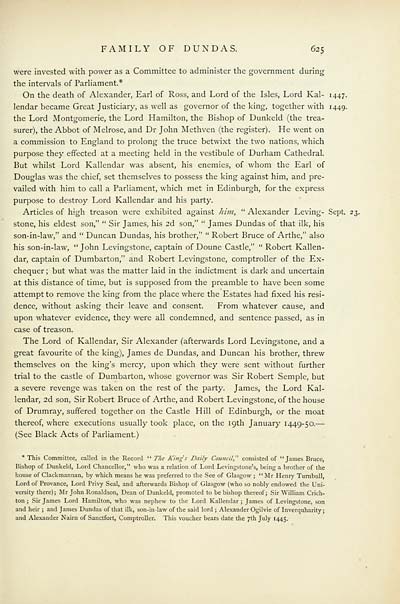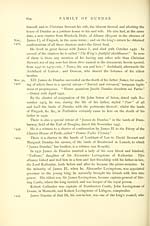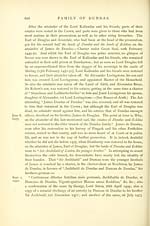Family records of the Bruces and the Cumyns
(645) Page 625
Download files
Complete book:
Individual page:
Thumbnail gallery: Grid view | List view

FAMILY OF DUNDAS. 625
were invested with power as a Committee to administer the government during
the intervals of Parliament.*
On the death of Alexander, Earl of Ross, and Lord of the Isles, Lord Kal- 1447.
lendar became Great Justiciary, as well as governor of the king, together with 1449.
the Lord Montgomerie, the Lord Hamilton, the Bishop of Dunkeld (the trea-
surer), the Abbot of Melrose, and Dr John Methven (the register). He went on
a commission to England to prolong the truce betwixt the two nations, which
purpose they effected at a meeting held in the vestibule of Durham Cathedral.
But whilst Lord Kallendar was absent, his enemies, of whom the Earl of
Douglas was the chief, set themselves to possess the king against him, and pre-
vailed with him to call a Parliament, which met in Edinburgh, for the express
purpose to destroy Lord Kallendar and his party.
Articles of high treason were exhibited against him, " Alexander Leving- Sept. 23.
stone, his eldest son," " Sir James, his 2d son," " James Dundas of that ilk, his
son-in-law," and " Duncan Dundas, his brother," " Robert Bruce of Arthe," also
his son-in-law, " John Levingstone, captain of Doune Castle," " Robert Kallen-
dar, captain of Dumbarton," and Robert Levingstone, comptroller of the Ex-
chequer ; but what was the matter laid in the indictment is dark and uncertain
at this distance of time, but is supposed from the preamble to have been some
attempt to remove the king from the place where the Estates had fixed his resi-
dence, without asking their leave and consent. From whatever cause, and
upon whatever evidence, they were all condemned, and sentence passed, as in
case of treason.
The Lord of Kallendar, Sir Alexander (afterwards Lord Levingstone, and a
great favourite of the king), James de Dundas, and Duncan his brother, threw
themselves on the king's mercy, upon which they were sent without further
trial to the castle of Dumbarton, whose governor was Sir Robert Semple, but
a severe revenge was taken on the rest of the party. James, the Lord Kal-
lendar, 2d son, Sir Robert Bruce of Arthe, and Robert Levingstone, of the house
of Drumray, suffered together on the Castle Hill of Edinburgh, or the moat
thereof, where executions usually took place, on the 19th January 1449-50. —
(See Black Acts of Parliament.)
* This Committee, called in the Record " The Kings Daily Council" consisted of "James Bruce,
Bishop of Dunkeld, Lord Chancellor," who was a relation of Lord Levingstone's, being a brother of the
house of Clackmannan, by which means he was preferred to the See of Glasgow ; "Mr Henry Turnbull,
Lord of Provance, Lord Privy Seal, and afterwards Bishop of Glasgow (who so nobly endowed the Uni-
versity there); Mr John Ronaldson, Dean of Dunkeld, promoted to be bishop thereof; Sir William Crich-
ton ; Sir James Lord Hamilton, who was nephew to the Lord Kallendar ; James of Levingstone, son
and heir ; and James Dundas of that ilk, son-in-law of the said lord ; Alexander Ogilvie of Inverquharity ;
and Alexander Nairn of Sanctfort, Comptroller. This voucher bears date the 7th July 1445.
were invested with power as a Committee to administer the government during
the intervals of Parliament.*
On the death of Alexander, Earl of Ross, and Lord of the Isles, Lord Kal- 1447.
lendar became Great Justiciary, as well as governor of the king, together with 1449.
the Lord Montgomerie, the Lord Hamilton, the Bishop of Dunkeld (the trea-
surer), the Abbot of Melrose, and Dr John Methven (the register). He went on
a commission to England to prolong the truce betwixt the two nations, which
purpose they effected at a meeting held in the vestibule of Durham Cathedral.
But whilst Lord Kallendar was absent, his enemies, of whom the Earl of
Douglas was the chief, set themselves to possess the king against him, and pre-
vailed with him to call a Parliament, which met in Edinburgh, for the express
purpose to destroy Lord Kallendar and his party.
Articles of high treason were exhibited against him, " Alexander Leving- Sept. 23.
stone, his eldest son," " Sir James, his 2d son," " James Dundas of that ilk, his
son-in-law," and " Duncan Dundas, his brother," " Robert Bruce of Arthe," also
his son-in-law, " John Levingstone, captain of Doune Castle," " Robert Kallen-
dar, captain of Dumbarton," and Robert Levingstone, comptroller of the Ex-
chequer ; but what was the matter laid in the indictment is dark and uncertain
at this distance of time, but is supposed from the preamble to have been some
attempt to remove the king from the place where the Estates had fixed his resi-
dence, without asking their leave and consent. From whatever cause, and
upon whatever evidence, they were all condemned, and sentence passed, as in
case of treason.
The Lord of Kallendar, Sir Alexander (afterwards Lord Levingstone, and a
great favourite of the king), James de Dundas, and Duncan his brother, threw
themselves on the king's mercy, upon which they were sent without further
trial to the castle of Dumbarton, whose governor was Sir Robert Semple, but
a severe revenge was taken on the rest of the party. James, the Lord Kal-
lendar, 2d son, Sir Robert Bruce of Arthe, and Robert Levingstone, of the house
of Drumray, suffered together on the Castle Hill of Edinburgh, or the moat
thereof, where executions usually took place, on the 19th January 1449-50. —
(See Black Acts of Parliament.)
* This Committee, called in the Record " The Kings Daily Council" consisted of "James Bruce,
Bishop of Dunkeld, Lord Chancellor," who was a relation of Lord Levingstone's, being a brother of the
house of Clackmannan, by which means he was preferred to the See of Glasgow ; "Mr Henry Turnbull,
Lord of Provance, Lord Privy Seal, and afterwards Bishop of Glasgow (who so nobly endowed the Uni-
versity there); Mr John Ronaldson, Dean of Dunkeld, promoted to be bishop thereof; Sir William Crich-
ton ; Sir James Lord Hamilton, who was nephew to the Lord Kallendar ; James of Levingstone, son
and heir ; and James Dundas of that ilk, son-in-law of the said lord ; Alexander Ogilvie of Inverquharity ;
and Alexander Nairn of Sanctfort, Comptroller. This voucher bears date the 7th July 1445.
Set display mode to:
![]() Universal Viewer |
Universal Viewer | ![]() Mirador |
Large image | Transcription
Mirador |
Large image | Transcription
Images and transcriptions on this page, including medium image downloads, may be used under the Creative Commons Attribution 4.0 International Licence unless otherwise stated. ![]()
| Histories of Scottish families > Family records of the Bruces and the Cumyns > (645) Page 625 |
|---|
| Permanent URL | https://digital.nls.uk/95078726 |
|---|
| Description | A selection of almost 400 printed items relating to the history of Scottish families, mostly dating from the 19th and early 20th centuries. Includes memoirs, genealogies and clan histories, with a few produced by emigrant families. The earliest family history goes back to AD 916. |
|---|

